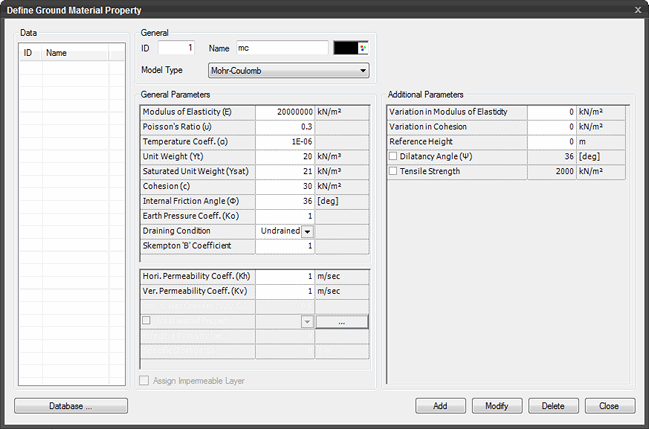
General Parameters
Modulus
of Elasticity (E)
The slope of the stress-strain
line for a linear isotropic material.
Poisson's Ratio (u)
The ratio of the radial
(or lateral) strain to the vertical strain.
Temperature Coeff. (α)
The relative change
of a physical property when the temperature is changed by 1 K.
Unit Weight (Υt)
The weight of soil per unit volume.
Saturated Unit Weight
(Υsat)
The weight of saturated soil per unit volume.
Cohesion (c)
It is a measure of the forces that cement
particles of soil.
Internal Friction Angle
(Φ)
It is a measure of the shear strength of
soils due to friction.
Earth
Pressure Coeff. (Ko)
The ratio of horizontal
principal effective stress to the vertical principal effective stress.
Draining Condition
Drained
Dissipation of pore water pressure takes
place upon the load application.
Undrained
Dissipation of pore water pressure does
not take place upon the load application.
Skempton
'B' Coefficient
Enter
the value of the coefficient for an 'Undrained' condition.
Hori.
Permeability Coeff. (Kh) (only for Soft
Ground Module)
The coefficient of permeability in horizontal
direction.
Ver. Permeability Coeff.
(Kv) (only for Soft Ground Module)
The coefficient of permeability in vertical
direction.
Additional
Parameters
Variation in Modulus of Elasticity
Change
of elasticity modulus within a ground layer of identical parameters with
change in depth referenced w.r.t. Reference Height. It is calculated on
the basis of the Modulus of Elasticity defined under General
Parameters.
Variation
in Cohesion
Change
of cohesion within a ground layer of identical parameters with change
in depth referenced w.r.t. Reference Height. It is calculated on the basis
of the Cohesion (c) defined under General
Parameters.
Reference
Height
Height
taken as a reference (in GCS) for considering variation of parameters.
Dilatancy
Angle (ψ)
It
represents the ratio between a volumetric strain and a shear strain rate.
If un-checked, the same value as the Internal Friction Angle is reflected
in analysis.
Tensile
Strength
Input
when tension cut-off is considered. It is set to zero if a larger value
is entered than the Cohesion (c) and the tensile strength calculated from
the Internal Friction Angle (Φ) specified in General
Parameters.
Safety
Factor Calculation (only for Tunnel
Module)

The
safety factor is calculated on the basis of the ratio of the current state
of stress of the material to the Mohr-Coulomb failure criterion. The
Mohr-Coulomb failure criterion is most widely used criterion for brittle
materials like ground. SoilWorks uses the criterion
for all the material models in the Tunnel Module.
| 






